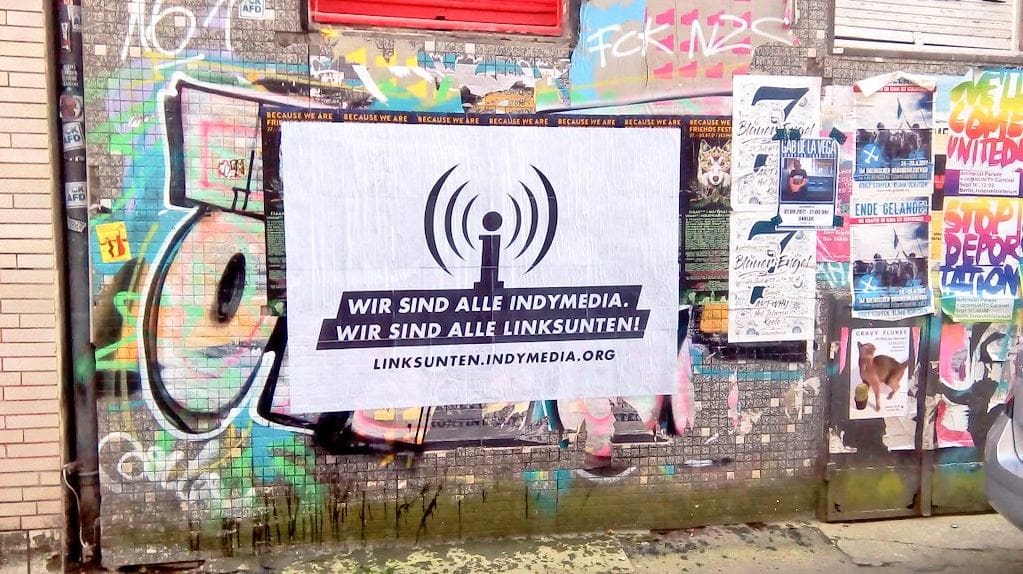AntiNote: Once again, years of experience and research have been poured into an article challenging entrenched narratives on the anglophone institutional left, and once again, fear of retaliation from the purveyors of these entrenched narratives has made this challenge unpalatable even to left and liberal publishers with an obvious interest in countering them. So, once again, the Antidote Writers Collective is pleased to participate in a decentralized effort to bring this challenge out into the open. The following was initially published on CounterVortex with the understanding that the website’s publisher would be backed up by cross-posts from sympathetic websites in order to reduce the authoritarian left’s ability to target one vulnerable person with their classic arsenal of trolling, threats, abuse, and lawsuits.
Comrade of the zine Terry Burke has been a dedicated peace activist her entire life, and has already heard the worst of it even from former comrades who have unthinkingly taken on Putinist narratives and allowed themselves to be played against the emergence of an effective opposition to rising fascism in the United States. We salute her years of persistence and are proud to have her back. Enjoy.
Russiagate, Syria, and the Left
by Terry Burke for CounterVortex
27 June 2019 (original post)
The last major national protest in the US was “Families Belong Together” in June 2018. Hundreds of thousands of people across the country demonstrated against the Trump administration’s policy of separating children and families at the border. People who had never protested before brought their families. It’s now a year later and the situation for immigrant families has only gotten worse. Where is the outrage?
Plans for an ICE raid targeting millions of immigrants. Initiating a military strike on Iran and then canceling it. Environmental policies that disregard climate change. Pulling the US out of treaties. Rising alt right and nationalism around the world. Ignoring congressional subpoenas. Corrupt, incompetent people heading every federal agency. The list of destructive Trump policies seems endless.
Trump’s recent visit to London brought tens of thousands of protesters into the streets. Where are the protests in the US? Where are the coalitions in the US organizing against Trump’s anti-democratic, inhumane policies? Where is the left?
Part of the problem is the enormous amount of disinformation that has been specifically directed at the left, disinformation that most people don’t recognize. The disinfo uses anti-imperialist language and is posted on “left” and “progressive” sites that usually have nominally accurate stories on Palestine, Israel, climate change, corporate corruption, and other progressive issues. In addition to the disinfo media sites, respected left authors have confused their readers by dismissing “Russiagate” as a hoax, claiming that Russian interference in the US elections has been greatly exaggerated to provide the Democrats an excuse for Clinton’s loss.
Eight years of steady disinformation on Syria have created a split in the peace movement. The enormous amount of time and energy spent debating Syria could have gone to building the peace movement instead of dividing it. The doubts raised repeatedly about Russian interference and Mueller’s investigation have weakened the opposition to Trump. Some people don’t know which news sources they can trust. Others restrict themselves only to sources that support their ideological line.
Steve Bannon famously said, “The Democrats don’t matter. The real opposition is the media. And the way to deal with them is to flood the zone with shit.” That is exactly what has happened. There are thousands of new and unaccountable media organizations on the internet.
As Syria solidarity activists, we have been struggling against extensive, sophisticated disinformation regarding Syria for years — and it’s largely not from the US mainstream media. Syria is not Iraq, where the New York Times helped Bush lead us into war with fake information about WMDs. Syria is not Kuwait, where there were false stories planted about babies in incubators.
The mainstream media articles “demonizing” Assad are fundamentally true – his regime is one of the world’s most repressive, with a vast police and prison torture system of historic proportions. Unlike Iraq and Iran, and contrary to the propaganda claims, the CIA did not instigate a serious covert regime change operation in Syria. The US efforts in Syria are well documented in Shane Bauer’s recent two part article for Mother Jones. He writes that “American involvement in Syria has been as fragmented and volatile as the conflict itself.” In this groundbreaking article, he documents how the US has spent billions, initially aiding the Free Syrian Army, but ultimately focused on combating ISIS, forbidding US-backed groups from fighting Assad’s forces.
His article corroborates the stories of anti-Assad Syrians: of a genuine uprising against a brutal dictator evolving into a proxy war; of Assad bombing and starving civilians. The Syrian people were caught up in the fervor of the Arab Spring and surprised themselves (and the CIA) by going to the streets in the hundreds of thousands, demonstrating for democracy, overcoming their deep fears of reprisal.
However, most of the peace movement still doesn’t recognize the legitimacy of the Syrian people’s eight-year struggle against the Assad dictatorship. There have been so many articles in “progressive” media promoting Assad’s narrative of another US regime change effort that they have buried the voices of Syrians.
The voices of Syrian communists, anarchists, democracy activists, writers, artists, intellectuals, and nonviolence activists have rarely been represented in “progressive” media. The majority of these media’s articles on Syria have been written by non-Syrians and they usually promote Assad’s line that he is protecting his sovereign country from US-backed terrorists.
Research from the University of Washington has shown how dominant the pro-Assad political messaging is from an “echo-system” of sites that follow Russian, Iranian, and Syrian government funded media. Researchers examined Twitter conversations about the White Helmets (a Syrian volunteer rescue group) in the summer of 2017. There were four times as many tweets from the “echo-system” as there were from other media sources. Articles from the “echo-system” claimed the White Helmets were a “propaganda construct,” “crisis actors” who staged events, and “that they worked with or were themselves terrorists.”
The UW study noted that this “echo-system” of sites claiming to be “independent” and “alternative” shared the same stories and writers. A few of these sites are Global Research, RT, Mint Press News, Sputnik News, Free Thought Project, The Anti-Media, 21st Century Wire, Veterans Today, Zero Hedge, and many others.
For Syria activists, the UW research wasn’t a surprise. It confirmed our experiences over the last six years, that our struggle to get the truth out was up against a substantial, coordinated disinformation effort. We were familiar with this “echo-system” well before the UW study. While they claim to be “independent,” their political line was almost always the same on Syria, Crimea, Putin, and Trump. They played a role in electing Trump by bashing Clinton, equating Clinton and Trump, going easy on Trump, and disparaging voting.
While the sites claim to be funded by their readers and ads, they actually have very few ads and do not disclose information on their funding sources. In 2013, a former writer at Mint Press News, Joey LeMay, told BuzzFeed News, “It was incredibly secretive.” The article goes on to say there were “barely any ads on the website, and whenever LeMay asked about where they got their money, ‘it was brushed off as a nonissue. I would go home feeling not squeaky clean,’ he said.”
The sites in this “echo-system” have all also posted numerous “Russiagate” articles. It’s understandable that progressives would question how extensive and effective Russian propaganda was in the 2016 elections. The mainstream media hasn’t examined Russian propaganda that targets the left. The UW research has not been mentioned in mainstream or progressive media. But it’s not an either/or proposition – we can criticize Clinton’s campaign and still acknowledge that Russian interference helped Trump win in an election where Clinton won the popular vote by a substantial margin.
The claim that a few Facebook ads bought with Russian rubles could have influenced the 2016 election may have seemed preposterous back in 2016. However, since then, there have been numerous exposés of Russia’s sophisticated use of social media and information warfare – something we had thought was mainly the province of our CIA.
While Russian disinformation is a new concern for Americans, not so for Europeans. In June 2017 the Washington Post reported that “across the [European] continent, counterintelligence officials, legislators, researchers and journalists have devoted years — in some cases, decades — to the development of ways to counter Russian disinformation, hacking and trolling.” There have been numerous articles on how Sweden, the Baltic states, Finland, Germany, France, Italy, and others are dealing with Russian cyber attempts to influence elections and sway popular opinion.
When well-known left writers like Glenn Greenwald, Matt Taibbi, Katrina vanden Heuvel, Norman Solomon, and Max Blumenthal immediately denounced the evidence of Russian interference back in 2016, it had a silencing effect. After that, few well-known left writers pursued the serious possibility of effective Russian involvement. In the two and a half years since Trump’s election, there have continued to be new articles and research on Russian bots, trolls, Twitter campaigns, fake accounts, and continued Russian interference in the EU, but the “Russiagate” authors have ignored this information. Dark Money author Jane Mayer has also written on how Russia helped elect Trump.
After the release of the highly biased Barr summary which seemed to vindicate them, Chris Hedges, Glenn Greenwald, Stephen Cohen, Matt Taibbi, Aaron Mate, Paul Street in Counterpunch, and Katie Halper from FAIR castigated the US press for its extensive coverage of the Russia/Trump allegations.
However, they wrote nothing revising their Russiagate-is-a-hoax position after the subsequent release of the redacted Mueller report in April and Mueller’s public statement in May. The Mueller report explicitly documents extensive Russian interference in the 2016 elections, but they have refused to acknowledge this.
Greenwald wrote on April 18 that “the actions in which Trump engaged were simply not enough for Mueller to conclude that he was guilty of criminal obstruction.” After Mueller clearly stated on May 29 that he would not exonerate the president for obstruction of justice, Greenwald wrote a series of articles on Brazil and wrote nothing to correct his earlier misstatements about obstruction.
It is critical to understand that the “Russiagate” narrative is Trump’s narrative. By insisting for over two years that Russian interference was overblown, these authors have been defending the worst president in US history.
The UW-identified “echo-system” of “alternative” media sites has also had numerous articles promoting Russiagate skepticism and Barr’s disingenuous summary of the Mueller Report. Global Research, Mint Press News, Free Thought Project, The Anti-Media, Zero Hedge, 21st Century Wire, Activist Post and others have also continued to argue for the Russiagate conspiracy thesis, despite Mueller’s statement and all the information on Russian cyberwarfare.
Even Fox News occasionally departs from supporting Trump’s position on Russian interference, as summed up in a May 2019 Newsweek headline: “Fox News Legal Analyst Says Mueller Evidence Against Trump ‘Remarkably Similar’ to Nixon, Clinton Impeachment Charges.” But the left’s Russiagate skeptics have not conceded anything. Stephen Cohen recently wrote that Russiagate “is the worst and … most fraudulent political scandal in American history.”
The “echo-system” and the Russiagate authors have published very little criticism of Putin’s Russia. They have many articles criticizing the US mainstream media, the corporate ownership of US media, “censorship” by Facebook and YouTube…but nothing on the new law in Russia whereby people can be jailed for fifteen days for “disrespecting” the Russian government online. An open internet in the US means there are thousands of sites with articles criticizing the US, but even one site with critical articles in Russia could result in fines and jail time. The difference is dramatic, and there have been no articles from the Russiagate skeptics on this oppressive law.
It’s rarely mentioned that Hedges has had a weekly show on RT (formerly Russia Today) since June 2016, which is funded by the Russian government. He’s scathing in his criticism of the US, but it’s hard to find his criticisms of Russia. After the Barr summary, he chastised the US press for “one of the most shameful periods in modern American journalism” and somehow never mentions the Russian restrictions on “disrespecting” the Russian government online.
Rania Khalek is also paid by the Russian government. Her site In the Now is one of three that were recently exposed as being owned by RT. Facebook briefly took them down until a small mention of RT’s involvement was placed on the page – a mention most people will never notice.
It is difficult to determine the motivation of the Russiagate writers and the “echo-system.” Kate Starbird at the University of Washington writes about the “echo-system” that “[their] efforts … consist of diverse individuals and organizations who are driven by a variety of different motivations (including political, financial, and ideological).”
There is a certain amount of hyperbole to the Russiagate articles. The investigation is blamed for “Manufacturing War with Russia,” for “Endangering American Security,” for “Media Malpractice,” for being “This Generation’s WMD,” for “Target[ing] Any Dissent in US,” and so forth. When examining these authors’ lists of articles, one would prefer they had spent as much analysis on the dangers of a Trump presidency as they have spent on promoting their Russiagate thesis.
Stephen Cohen talks about the origins of the allegation that Trump was an agent of the Kremlin. Was it “begun somewhere high up in America by people who didn’t want a pro-détente president?” He suggests that “this originated with Brennan and the CIA.” It is all speculation, with no corroborating evidence.
For a starkly different perspective, consult authoritarianism scholars Sarah Kendzior or Timothy Snyder’s interviews, writings, and videos for detailed documentation of Trump’s dealings with Russia. They have been warning for the last three years about the dangers of the US sliding into an autocracy under Trump. They have researched Trump’s ties to Russia in the decades before the 2016 elections and have tried to warn us about what is coming.
Contrast Cohen’s speculation with Snyder’s detailed factual information. Snyder is a Yale historian who wrote The Road to Unfreedom about Russia’s return to an authoritarian government under Putin and the rise of nationalism in Europe and America. He has put together a series of videos to explain what is happening here and internationally. In a concise Twitter thread, he documents fifty very specific reasons (with citations) why Trump owes a debt to Putin. He discusses the people in Trump’s campaign and in the Trump administration: “It is astounding how many of them are more directly connected to the Russian Federation than to the US.”
Kendzior lived in Uzbekistan during its transition from democracy to autocratic rule. When she started covering the Trump campaign in 2016, it reminded her of what she’d seen from the regime in Uzbekistan. Her website and podcast Gaslit Nation, which she presents together with journalist Andrea Chalupa, is an unparalleled source of information about Trump and his Russian connections and crimes. Kendzior and Chalupa advocate impeachment hearings so that the rest of the country can learn about these crimes.
Snyder and Kendzior have no doubts about the Trump/Russia collusion. There are other independent authors and researchers who are documenting and exposing what’s happening. Even without the Mueller report, there is an enormous amount of public information about Trump’s ties to the Kremlin, Russian interference, and the loss of our democracy.
When Syria solidarity activists first read the November 2016 Washington Post article about Russian propaganda influencing the 2016 elections, we were relieved. Finally the Russian propaganda we had struggled against for years was being exposed! We assumed the propaganda on Syria would also be exposed. We thought the propaganda sites on the internet would be discredited.
We didn’t anticipate that prominent left writers would immediately denounce the Russian propaganda story as the “new McCarthyism” and “Russiagate” and that they would still be defending this narrative two and a half years later, in the face of so much evidence.
We didn’t understand how difficult it would be for the techies at Facebook, YouTube, and Twitter to discern propaganda from the truth and how clumsy they would be in taking down sites – usually with almost no explanation, and occasionally taking down legitimate sites at the same time.
From our viewpoint as Syria solidarity activists, we are still in the same position now as we were in November 2016. Disinformation still dominates the internet. Syrian and Russian planes have been bombing civilians in Idlib for the last month, initially bombing twenty-five hospitals. While Physicians for Human Rights and Amnesty International have condemned the strikes on hospitals, sounding the alarm, there is no international pressure on Russia and Syria to end them. The “echo-system” of media sites is distracting the left with disinformation about Assad’s 2018 chemical attack on civilians in Douma being supposedly “staged” by the rebels.
The persistent Russiagate articles from prominent left writers have many progressives feeling unsure what to believe. It has put us in the strange position of claiming that a former FBI director is more trustworthy than Chris Hedges or Stephen Cohen. But there is much more information validating what Mueller has reported than there is for the Russiagate skeptics and Trump.
There is no easy solution to the problem of massive disinformation on the internet. Certainly we should be listening to the voices of progressive Syrians, Venezuelans, Palestinians, Ukrainians, Sudanese – not media pages that follow Putin’s line. Information about who is funding web pages would be one step towards transparency. Independent university research labs could evaluate the accuracy of media sites.
Another voice we should be listening to now is the authoritarianism scholar based in St. Louis: Sarah Kendzior says that Trump’s administration is a transnational crime syndicate masquerading as a government and that he should be impeached. It’s time for us to be in the streets.
Terry Burke is an activist with the Committee in Solidarity with the People of Syria (CISPOS) in Minneapolis.
Featured image source: Mike Maguire (Flickr) via Countervortex





